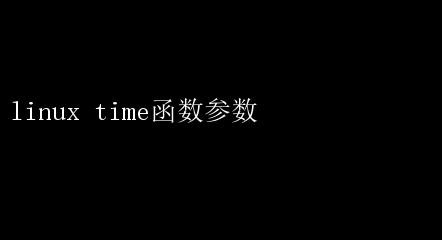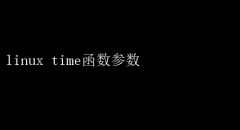
无论是进行时间计算、时间格式转换,还是进行性能评估,时间函数都发挥着至关重要的作用
本文将深入探讨Linux中常用的时间函数及其参数,帮助开发者更好地理解和应用这些函数
一、时间获取与设置函数 1.time函数 `time`函数是Linux中用于获取当前时间的基本函数
其函数原型为: c time_ttime(time_t t); 该函数返回从1970年1月1日00:00:00 UTC(也称为Unix纪元或Epoch时间)起至今所经过的秒数
如果参数`t`不为NULL,则`time`函数还会将这个时间值存储在`t`指向的内存位置
示例代码如下: c time_t now; time(&now); printf(Current time in seconds since Epoch: %ld , now); 在这个例子中,`time`函数将当前时间(以秒为单位)存储在变量`now`中,然后将其打印出来
2.gettimeofday和settimeofday函数 `gettimeofday`和`settimeofday`函数提供了更精确的时间获取和设置功能
它们的函数原型如下: c int gettimeofday(struct timevaltv, struct timezone tz); int settimeofday(const structtimeval tv, const struct timezone tz); 其中,`struct timeval`结构体包含两个成员:`tv_sec`(秒)和`tv_usec`(微秒),用于表示时间
而`struct timezone`结构体(现已废弃)则用于表示时区信息
在使用`gettimeofday`时,如果`tv`或`tz`为NULL,则相应的结构不会被设置或返回
由于`timezone`结构体已废弃,通常应将`tz`设置为NULL
示例代码如下: c struct timeval tv; gettimeofday(&tv, NULL); printf(Current time in seconds since Epoch: %ld, microseconds: %ldn, tv.tv_sec, tv.tv_usec); 在这个例子中,`gettimeofday`函数将当前时间(以秒和微秒为单位)存储在`tv`结构体中,然后将其打印出来
二、时间格式化函数 1.ctime函数族 ctime函数族包括`ctime`、`asctime`、`gmtime`、`localtime`、`mktime`等函数,它们主要用于将时间和日期转换为不同的格式
-ctime和asctime函数 `ctime`和`asctime`函数将时间转换为可读的ASCII字符串格式
它们的函数原型如下: ```c charctime(const time_t timep); charasctime(const struct tm tm); ``` `ctime`函数接受一个`time_t`类型的参数,并返回一个指向表示本地时间的ASCII字符串的指针
而`asctime`函数则接受一个`struct tm`类型的参数,并返回一个指向表示该时间的ASCII字符串的指针
示例代码如下: ```c time_t now; time(&now); printf(Current time in local timezone: %s, ctime(&now)); structtm tm_now = localtime(&now); printf(Current time in tm format: %s, asctime(tm_now)); ``` -gmtime和localtime函数 `gmtime`和`localtime`函数将`time_t`类型的时间转换为`struct tm`类型的时间
它们的函数原型如下: ```c structtm gmtime(const time_t timep); structtm localtime(const time_t timep); ``` `gmtime`函数返回的时间为UTC时间,而`localtime`函数返回的时间为本地时间
示例代码如下: ```c time_t now; time(&now); structtm gmt = gmtime(&now); structtm local = localtime(&now); printf(Current UTC time: %d-%d-%d %d:%d:%dn, gmt->tm_year + 1900, gmt->tm_mon + 1, gmt->tm_mday, gmt->tm_hour, gmt->tm_min, gmt->tm_sec); printf(Current local time: %d-%d-%d %d:%d:%dn, local->tm_year + 1900, local->tm_mon + 1, local->tm_mday, local->tm_hour, local->tm_min, local->tm_sec); ``` -mktime函数 `mktime`函数将`struct tm`类型的时间转换为`time_t`类型的时间
其函数原型如下: ```c time_t mktime(structtm tm); ``` 该函数将`struct tm`结构体中的时间转换为从Epoch时间起至今所经过的秒数(UTC时间)
示例代码如下: ```c struct tm tm= {0}; tm.tm_year = 120; // Year since 1900(202 tm.tm_mon = 9 - 1; //Month (0-11) (September) tm.tm_mday = 15; // Day of the month tm.tm_hour = 12; // Hour sincemidnight (0-23) tm.tm_min = 30; // Minute after the hour(0-5 tm.tm_sec = 0; // Seconds after theminute (0-60) time_ttime_since_epoch = mktime(&tm); printf(Time in seconds since Epoch: %ldn,time_since_epoch); ``` 三、strftime函数 `strftime`函数是一个强大的时间格式化函数,它允许用户按照指定的格式将时间转换为字符串
其函数原型如下: size_t strftime(chars, size_t max, const char format, const struct tmtm); 其中,`s`是存储格式化后的时间字符串的缓冲区,`max`是缓冲区的大小,`format`是格式化字符串,`tm`是指向`struct tm`结构体的指针
示例代码如下: struct tm tm =localtime(NULL); char buffer【80】; strftime(buffer,sizeof(buffer), %Y-%m-%d %H:%M:%S, &tm); printf(Formatted local time: %s , buffer); 在这个例子中,`strftime`函数将本地时间按照“YYYY-MM-DD HH:MM:SS”的格式转换为字符串,并将其存储在`buffer`中
四、总结 Linux中的时间函数为开发者提供了丰富的时间处理功能
通过深入了解这些函数的参数和使用方法,开发者可以更加高效地处理时间和日期相关的任务
无论是进行时间计算、时间格式转换,还是进行性能评估,这些函数都能提供强大的支持
希望本文能够帮助开发者更好地理解和应用这些时间函数,提升编程效率和代码质量
